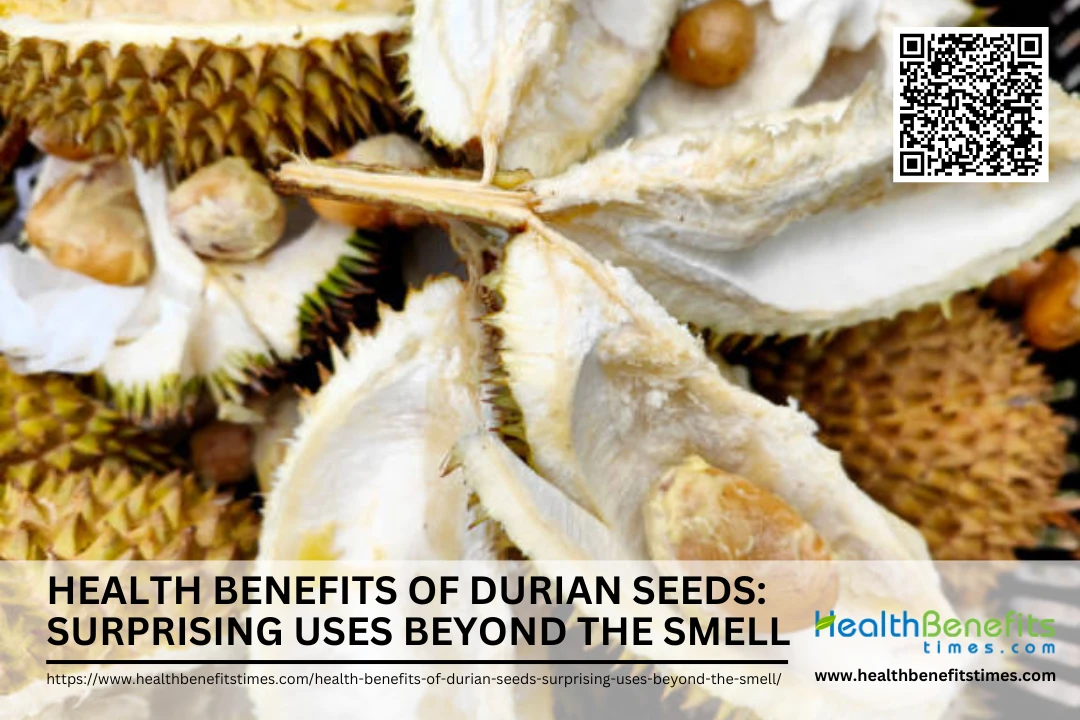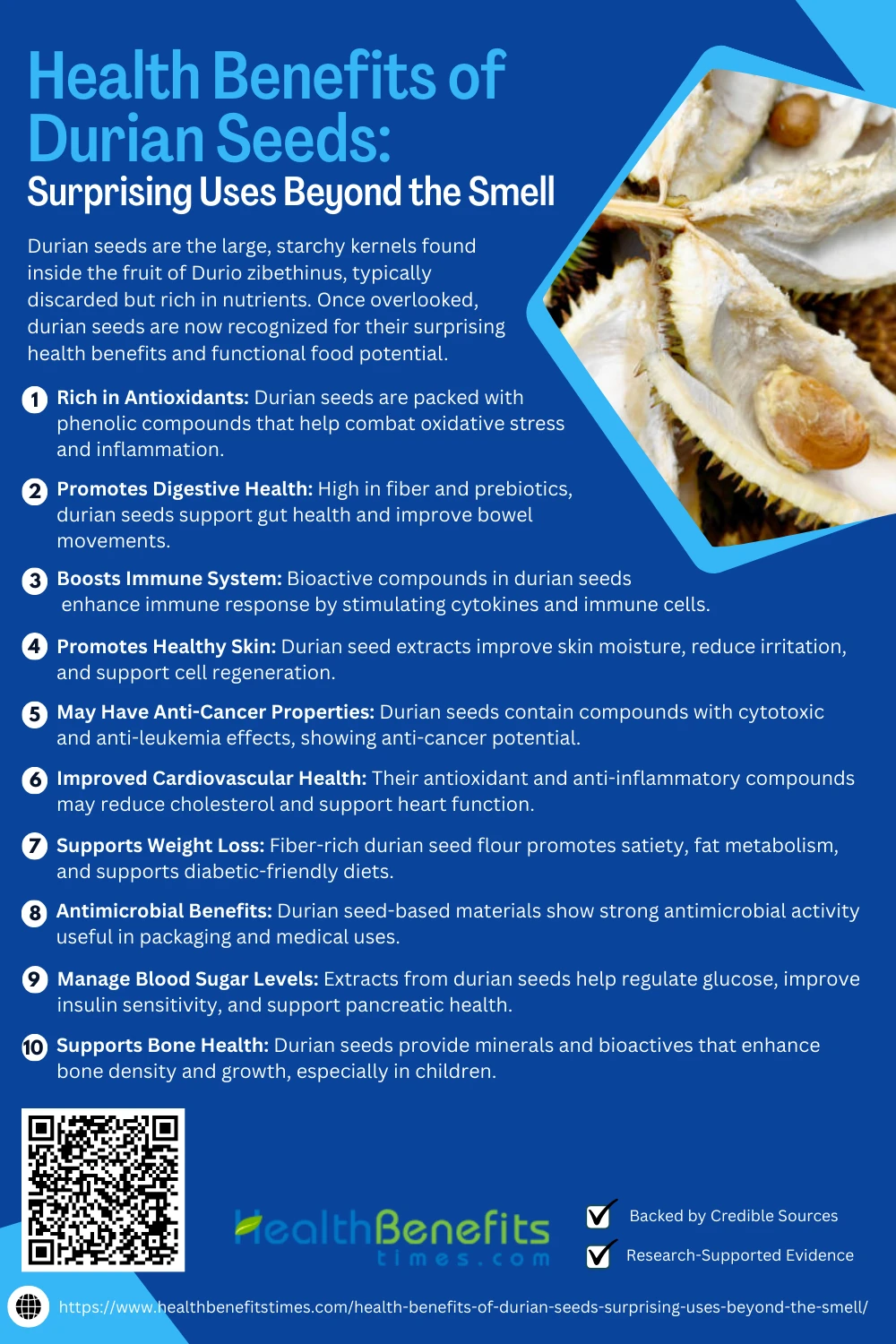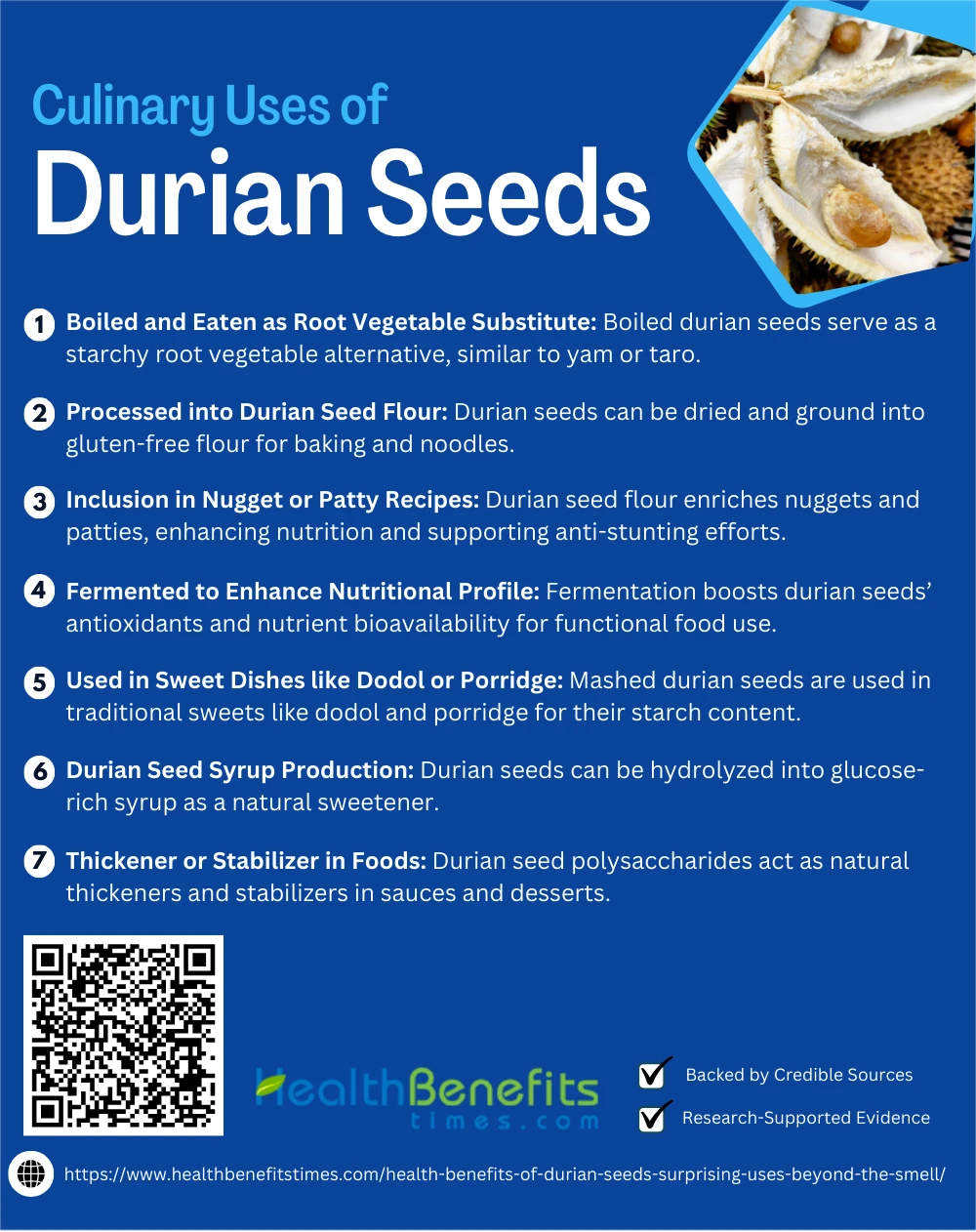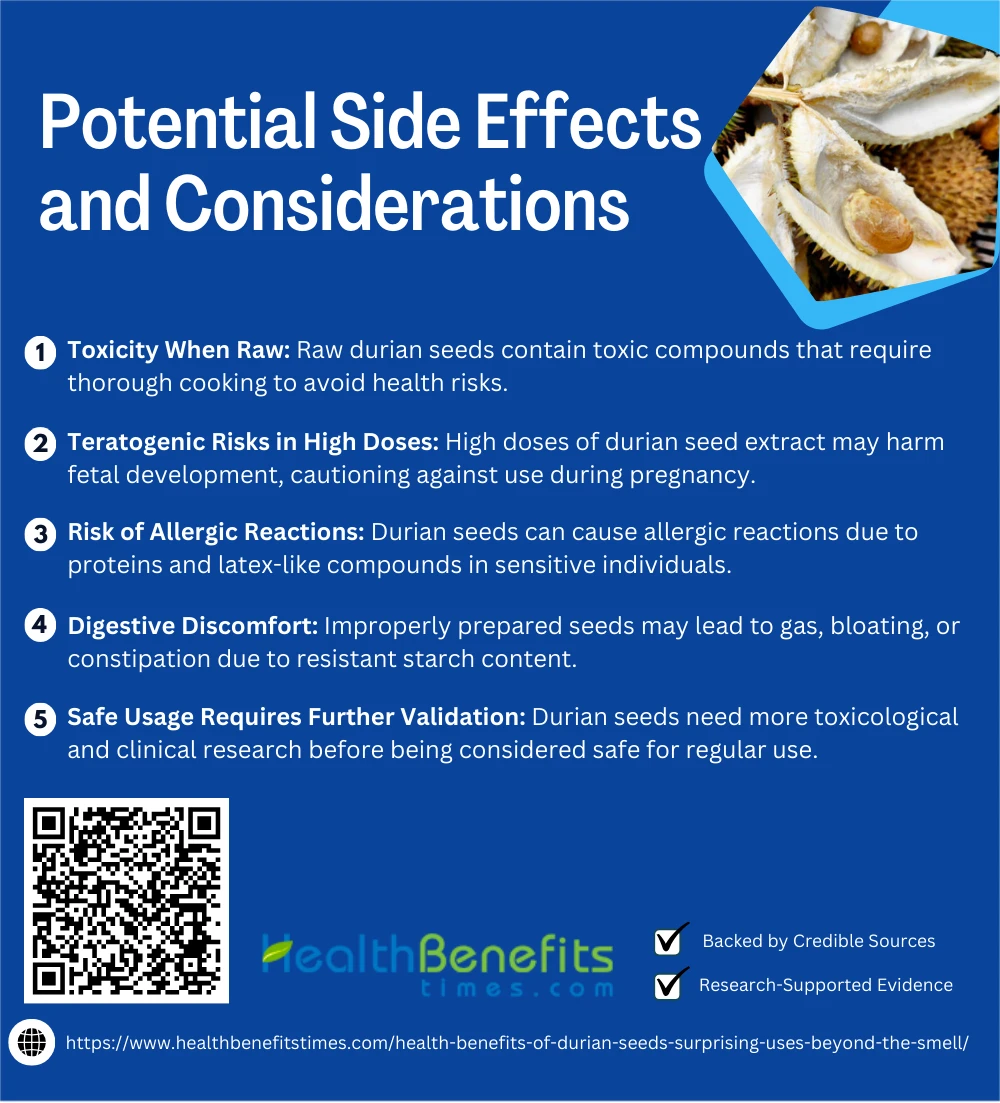- Durian seeds are the large, starchy kernels found inside the fruit of Durio zibethinus, typically discarded but rich in nutrients.
- Once overlooked, durian seeds are now recognized for their surprising health benefits and functional food potential.
- Beyond their pungent reputation, these seeds are used in traditional medicine, sweet dishes, and even anti-diabetic formulations.
 Durian, known as the “King of Fruits,” is a tropical fruit native to Southeast Asia, famous for its strong aroma, spiky outer shell, and rich, creamy flesh. While durian is often met with mixed reactions due to its powerful scent, the seeds of this exotic fruit are increasingly gaining recognition for their impressive health benefits. Durian seeds are rich in bioactive compounds, including antioxidants, fiber, and proteins, which are known to promote digestive health, regulate blood sugar levels, and enhance immune function. Studies have shown that the seeds contain flavonoids and polyphenols, which can have anti-inflammatory and anti-cancer effects. Furthermore, durian seeds are a potential source of functional foods and nutraceuticals, supporting various health-related applications, from antioxidant-rich teas to gluten-free flour. Their versatile use extends beyond nutrition, with extracts being explored for skin health and therapeutic purposes. A review published in the World Nutrition Journal discusses how the bioactive compounds in durian seeds may provide substantial health improvements and could become a staple in wellness-focused diets.These emerging applications underscore the untapped potential of durian seeds, making them a valuable addition to modern health practices.
Durian, known as the “King of Fruits,” is a tropical fruit native to Southeast Asia, famous for its strong aroma, spiky outer shell, and rich, creamy flesh. While durian is often met with mixed reactions due to its powerful scent, the seeds of this exotic fruit are increasingly gaining recognition for their impressive health benefits. Durian seeds are rich in bioactive compounds, including antioxidants, fiber, and proteins, which are known to promote digestive health, regulate blood sugar levels, and enhance immune function. Studies have shown that the seeds contain flavonoids and polyphenols, which can have anti-inflammatory and anti-cancer effects. Furthermore, durian seeds are a potential source of functional foods and nutraceuticals, supporting various health-related applications, from antioxidant-rich teas to gluten-free flour. Their versatile use extends beyond nutrition, with extracts being explored for skin health and therapeutic purposes. A review published in the World Nutrition Journal discusses how the bioactive compounds in durian seeds may provide substantial health improvements and could become a staple in wellness-focused diets.These emerging applications underscore the untapped potential of durian seeds, making them a valuable addition to modern health practices.
Understanding Durian Seeds
Durian, often referred to as the “King of Fruits,” is a tropical fruit native to Southeast Asia, renowned for its distinctive strong smell, spiky outer shell, and creamy flesh. The fruit’s unique aroma, which some find unpleasant while others adore, is due to a mix of volatile compounds, including sulfur. The fruit’s outer spiky rind protects its precious inner segments, including the soft, edible pulp and the large, flat seeds. Known for their richness, durian’s pulp and seeds are packed with nutrients, which contribute to the fruit’s popularity despite its polarizing smell. Learn more about durian fruit characteristics. (1)
Durian seeds, often discarded, are actually a treasure trove of nutritional value. They are rich in carbohydrates, fiber, protein, and essential fats, making them a great source of energy. Additionally, they contain antioxidants, such as flavonoids, which help in reducing oxidative stress. Studies have highlighted that the seeds are an excellent source of minerals, including potassium and magnesium, which support heart and muscle health. The composition of durian seeds, particularly their high fiber content, also aids digestion and promotes gut health. Explore more about durian seed composition. (2)
Nutritional profile of Durian seeds
Durian seeds, often overlooked, are a powerhouse of nutrients. Packed with healthy fats, protein, fiber, and essential vitamins, they offer various health benefits while providing a unique, nutritious addition to your diet.
1. High in Carbohydrates
Durian seeds are a rich source of carbohydrates, which serve as the body’s primary source of energy. These seeds contain complex carbohydrates that provide a sustained release of energy when consumed. Unlike simple sugars, complex carbs are broken down more slowly, helping to maintain stable blood sugar levels and providing long-lasting energy throughout the day. This makes durian seeds a good option for people seeking a natural energy boost, especially for those engaging in physical activities or needing energy for daily tasks.
2. Rich in Dietary Fiber
Durian seeds are packed with dietary fiber, which is essential for maintaining a healthy digestive system. Fiber helps to regulate bowel movements, preventing constipation and improving overall gut health. It also promotes the growth of beneficial bacteria in the gut, contributing to a healthy microbiome. Additionally, fiber plays a crucial role in controlling cholesterol levels and may help in the prevention of heart disease. Its ability to slow down digestion can also help in managing blood sugar levels, making durian seeds a great addition to a diabetic-friendly diet.
3. Source of Plant-Based Protein
Durian seeds provide a good amount of plant-based protein, making them an excellent choice for vegetarians and vegans who need to incorporate more protein into their diets. Protein is vital for repairing tissues, building muscles, and supporting immune function. Durian seeds offer an alternative to animal-based protein sources and provide essential amino acids required for overall body function. Including plant-based proteins from foods like durian seeds can contribute to muscle maintenance, growth, and recovery after physical activity.
4. Essential Fats
The fats found in durian seeds are primarily monounsaturated and polyunsaturated fats, which are considered healthy fats. These fats are beneficial for heart health as they help reduce bad cholesterol (LDL) levels and promote good cholesterol (HDL) levels. Healthy fats also support the absorption of fat-soluble vitamins such as A, D, E, and K. Additionally, the healthy fats in durian seeds contribute to maintaining healthy skin, brain function, and the production of hormones. Unlike trans fats or excessive saturated fats, the fats in durian seeds can help maintain optimal health when consumed in moderation.
5. Antioxidants
Durian seeds are rich in antioxidants, including flavonoids, polyphenols, and other compounds that play a critical role in protecting the body from oxidative stress. Oxidative stress occurs when there is an imbalance between free radicals and antioxidants in the body, leading to cell damage that can contribute to aging and the development of various diseases, including cancer and heart disease. Antioxidants in durian seeds help neutralize free radicals, thereby reducing inflammation, preventing cell damage, and potentially lowering the risk of chronic diseases.
6. Vitamins and Minerals
Durian seeds are packed with several vitamins and minerals that are essential for overall health. These include:
- Vitamin C: An important antioxidant that supports immune function, promotes skin health, and helps in wound healing.
- Potassium: A mineral that helps regulate blood pressure, muscle function, and fluid balance in the body.
- Magnesium: Crucial for nerve function, muscle relaxation, and maintaining bone health.
- Iron: Necessary for the production of red blood cells and transporting oxygen throughout the body. These nutrients help improve overall health, support various bodily functions, and contribute to the maintenance of strong bones, a healthy heart, and an efficient immune system.
7. Low Glycemic Index
The glycemic index (GI) measures how quickly carbohydrate-containing food raises blood sugar levels. Foods with a low GI are digested more slowly, resulting in a gradual release of sugar into the bloodstream. Durian seeds have a low glycemic index, which means they are less likely to cause sudden spikes in blood sugar. This makes them particularly beneficial for individuals with diabetes or those looking to manage their blood sugar levels. Low-GI foods also help with appetite regulation, as they keep you feeling full longer.
8. Gluten-Free
Durian seeds are naturally gluten-free, making them an excellent choice for individuals with celiac disease or gluten sensitivities. Gluten is a protein found in wheat, barley, and rye that can cause adverse reactions in people with gluten intolerance. Durian seeds, as a gluten-free alternative, can be used in various forms such as flour or incorporated into recipes, offering a safe option for those who need to avoid gluten. This makes them versatile and accessible for people following gluten-free diets or those looking to avoid processed gluten-filled foods.
Health Benefits of Durian Seeds
Durian seeds, rich in nutrients and antioxidants, offer impressive health benefits. From boosting immune function to promoting healthy skin and aiding digestion, these seeds are a valuable addition to your wellness routine.
1. Rich in Antioxidants
Durian seeds are gaining attention due to their rich antioxidant content, which contributes to their potential health benefits. Studies show that durian seeds contain high levels of phenolic compounds, which are primarily responsible for their antioxidant properties, helping in the prevention of oxidative stress-related diseases. These seeds have been highlighted as a valuable source of bioactive compounds with medicinal potential. Furthermore, research supports the notion that durian seeds can be used in the development of nutraceutical products. Their antioxidant activity rivals other tropical fruits, offering a natural alternative for boosting health and combating inflammation. Additionally, durian seeds are gaining attention for their ability to enhance shelf-life in food products through their antioxidative properties. (3)
2. Promotes Digestive Health
Durian seeds have been found to promote digestive health, primarily due to their high fiber and prebiotic properties. Research highlights that durian seed flour (DSF) contains indigestible polysaccharides that can enhance the growth of beneficial probiotic bacteria in the gut. (4) Additionally, studies suggest that durian seeds’ nutritional compounds contribute to better gastrointestinal health and regular bowel movements. (5) The seeds’ bioactive compounds are also linked to promoting gut flora balance and supporting overall digestive function. (6) Furthermore, durian seeds’ dietary fibers have been recognized for their ability to aid digestion and prevent constipation. (7) This makes them a valuable addition to functional food products focused on digestive health. (8)
3. Boosts Immune system
Durian seeds have demonstrated potential in boosting the immune system, thanks to their bioactive compounds. Studies have shown that durian seed flour and extracts can stimulate immune responses, such as the production of cytokines like TNF-α, which is essential for enhancing immune activity. (9) Research also indicates that durian seeds play a role in activating immune cells, further supporting their immune-boosting properties. (8) Additionally, the seeds’ polysaccharides are thought to have prebiotic effects, contributing to gut health and overall immunity. (4) Studies have also explored the seeds’ effectiveness in regulating immune responses through natural compounds. (10) Moreover, research has highlighted durian seed-derived products for their immunostimulatory effects in various studies. (11)
4. Promotes Healthy Skin
Durian seeds have demonstrated potential for promoting healthy skin due to their bioactive compounds and antioxidant properties. Research suggests that durian seed extracts, particularly in topical gel forms, can enhance skin moisture and reduce irritation, making them beneficial for skincare applications (Zebua et al., 2018). Durian seed flour is rich in compounds that contribute to skin health by promoting cell regeneration. (6) Additionally, the antioxidant and anti-inflammatory properties of durian seeds help in protecting skin from oxidative stress and inflammation. (8) Studies have also shown the potential of durian seeds in improving the appearance of the skin by enhancing the breakdown of fat cells. (12) Furthermore, the incorporation of durian seed extracts into cosmetic formulations is gaining popularity due to its promising benefits. (13)
5. May Have Anti-Cancer Properties
Durian seeds exhibit significant anti-cancer potential, supported by growing evidence of their bioactive compounds. Studies show that Monascus-fermented durian seed extracts possess potent antioxidant and cytotoxic effects on cancer cell lines. Moreover, durian-derived flavonoids have demonstrated anti-leukemia effects in HL-60 cells. A separate study highlighted the therapeutic promise of durian bio-waste, including seeds, in functional foods. Further reviews confirmed its phytochemical richness and anti-cancer action and possible use in nanomedicine (Masoomzadeh et al., 2023). ({% trusted %})
6. Improved Cardiovascular Health
Although direct studies on durian seeds and cardiovascular health remain limited, durian fruit and its by-products—such as the seeds—are rich in antioxidants and polyphenols that promote cardioprotective effects. (14) The anti-inflammatory compounds found in the seeds may lower arterial stiffness and enhance vascular function. (9) A review on tropical fruit seeds also highlighted the role of durian seed flour in reducing lipid levels. (15) Moreover, durian’s gum and starch components, extracted from seeds, have shown promise in lowering cholesterol. (16) Lastly, a comprehensive biochemical analysis identified essential micronutrients in durian seeds that could influence cardiovascular markers. (17)
7. Supports Weight Loss
Durian seeds are emerging as a promising ingredient in weight loss management due to their nutrient profile. Research indicates that the flour made from durian seeds, rich in dietary fiber, can help regulate fat accumulation and promote satiety, thereby supporting weight control Science Heritage. (18) Durian seed flour has been explored as an alternative carbohydrate source for diabetic individuals, further linking it to metabolic benefits Academia.edu. (19) Furthermore, durian seeds have been studied for their prebiotic properties, contributing to digestive health and potentially aiding weight loss World Nutrition Journal. (6) Additional research suggests that durian seed flour can aid in weight management by improving carbohydrate metabolism Horticulturae. (8) These findings highlight the diverse health benefits of incorporating durian seeds into weight management diets.
8. Antimicrobial Benefits
Durian seeds offer promising antimicrobial benefits, particularly when incorporated into biocompatible materials. Recent studies demonstrate that bio-foams infused with durian seed-based polymers and silver ions significantly inhibit microbial growth, making them effective for hygienic packaging. (20) A separate experiment using durian seed and carrot peel starch coatings confirmed antimicrobial and antioxidant properties, especially when paired with liquid smoke. (21) These findings support durian seeds as natural agents in food preservation and biomedical applications.
9. Manage blood sugar levels
Durian seed extract has shown potential in regulating blood sugar levels, particularly in diabetic models. A 2024 study revealed that durian seed extract significantly reduced fasting glucose and improved insulin sensitivity in rats with metabolic syndrome. Another investigation confirmed its effect on pancreatic repair in streptozotocin-induced rats. Additionally, its anti-diabetic function was linked to reduced kidney damage. (11) The seeds are also explored for glucose syrup alternatives, making them valuable for functional food development. (22)
10. Supports Bone Health
Durian seeds are emerging as a natural source for supporting bone health, largely due to their rich calcium, phosphorus, and prebiotic compounds. A study analyzing durian seed flour found that it promotes height in children through enhanced IGF-1 expression. (23) Other research highlighted its role in bone meal enrichment for stunted children. (24) Analysis revealed bioactive components in durian seed gum beneficial for skeletal growth. (25) The presence of calcium and potassium supports bone density, and its prebiotic polysaccharides may enhance nutrient absorption and bone metabolism. (26) (27)
Culinary Uses of Durian Seeds
Durian seeds, often discarded, can be transformed into delicious culinary creations. Whether roasted, boiled, or ground into flour, these versatile seeds add a unique flavor and texture to various dishes.
1. Boiled and Eaten as Root Vegetable Substitute
Durian seeds, after proper detoxification, are traditionally boiled and consumed as a root vegetable substitute, similar to taro or yam. Their starch-rich content makes them ideal for basic meals in rural communities. (28) Studies confirm their edibility post-cooking and nutritional potential as alternative carbohydrate sources. (29)
2. Processed into Durian Seed Flour
Durian seeds are increasingly processed into flour through drying and grinding techniques, yielding a gluten-free, starchy powder for baked goods and noodles. Research highlights its viability in functional food applications. (15) Its fiber-rich composition enhances nutritional profiles, while fermentation improves bioactivity. (27) (23)
3. Inclusion in Nugget or Patty Recipes
Durian seed flour is creatively incorporated into nuggets and patties, often combined with fish or meat to create nutrient-dense foods for children and families. Studies show it enhances protein intake and dietary fiber. (23) It’s especially valued in anti-stunting nutrition programs and local food sustainability efforts. (29) (24)
4. Fermented to Enhance Nutritional Profile
Fermentation of durian seeds using Monascus or lactic acid bacteria increases antioxidant activity and boosts bioavailability of nutrients. This process improves their functional food potential. Fermented seeds show higher polyphenolic content and are ideal for gut-friendly fermented products. (30) (15)
5. Used in Sweet Dishes like Dodol or Porridge
Durian seeds are traditionally mashed and integrated into sweet delicacies such as dodol and porridge, especially in rural Southeast Asia. These dishes leverage the seed’s natural starch and mild flavor. (29) Cultural preservation programs document their use in local dessert innovation, while community outreach encourages broader culinary applications. (24) (28)
6. Durian Seed Syrup Production
Durian seeds are processed through acid hydrolysis to yield glucose-rich syrup, offering a natural sweetener alternative. This process enhances the value of seed by-products in food industries. (22) The resulting syrup is tested for its stability and viscosity and is gaining relevance in sustainable sweetener development. (25) (26)
7. Thickener or Stabilizer in Foods
Durian seeds contain natural mucilage and polysaccharides that act as effective thickeners or stabilizers in food products like sauces and desserts. Their gum is comparable to commercial hydrocolloids. (25) Studies show improved emulsion stability and texture in formulations, making durian seed flour ideal for functional ingredient applications. (26) (31)
Durian Seed Extracts and Supplements
Durian seed extracts are gaining traction in the nutraceutical industry due to their high antioxidant activity and functional potential. Monascus-fermented seed extracts show promising therapeutic antioxidant effects. (32) A scoping review highlights their bioactive compound profile suitable for supplement formulation. (33) Additionally, durian seed gums are being explored as gel-forming agents in topical supplements and gels. (34)
Surprising Traditional Uses of Durian Seeds
Durian seeds, often discarded as waste, have long held surprising value in traditional practices. Across Southeast Asia, communities have creatively used them in remedies, rituals, and recipes—revealing their hidden potential in health, culture, and daily culinary life.
- Boiled as a Root Vegetable Substitute: Traditionally eaten like taro or yam after boiling to remove toxins.
- Mashed into Sweet Dishes: Used in making dodol (sticky rice dessert) or sweet porridge in rural Southeast Asia.
- Mixed in Protein Patties: Ground into flour and added to fish or meat to make affordable and nutritious nuggets.
- Used in Traditional Herbal Remedies: Believed in folk medicine to relieve digestive issues when properly prepared.
- Turned into Topical Healing Gels: Traditional healers use durian seed paste for minor skin irritations or burns.
- Caramelized or Roasted: In some cultures, seeds are roasted and eaten like chestnuts or caramelized for snacks.
- Used as a Thickening Agent: Ground into paste or powder to thicken sauces and broths in village kitchens.
Potential Side Effects and Considerations
While durian seeds offer various health benefits, it’s important to understand their potential side effects. Consuming them improperly or in excess may lead to digestive discomfort or toxic reactions in some cases.
1. Toxicity When Raw
Durian seeds contain cyclopropene fatty acids, which are toxic when consumed raw, posing risks of gastrointestinal distress or enzyme inhibition. Research stresses the need for proper heat treatment before use. (31) Toxicity screenings confirm potential hazards without cooking, and animal studies caution against high-dose ingestion. (35) (18)
2. Teratogenic Risks in High Doses
High doses of durian seed extract may pose teratogenic risks, potentially affecting fetal development during pregnancy. Animal studies observed skeletal and growth abnormalities in mice exposed to durian compounds. (35) Caution is advised in prenatal use and toxicological profiles recommend further validation. (18) (12)
3. Risk of Allergic Reactions
Durian seeds may trigger allergic reactions in sensitive individuals due to bioactive proteins and natural latex content. Some topical and supplement applications report mild irritation or rash. (25) Caution is recommended for first-time users, and allergy-related compounds in durian waste require further study. (12) (2)
4. Digestive Discomfort
Improperly processed durian seeds may lead to digestive discomfort due to their high resistant starch and fiber content. This can result in gas, bloating, or constipation. (31) Overconsumption without mucilage removal aggravates symptoms, and controlled cooking is essential for better digestibility. (9) (12)
5. Safe Usage Requires Further Validation
While durian seeds show promise in food and pharmaceutical applications, their long-term safety and standardization remain under-researched. Experts urge comprehensive toxicological assessments before widespread use. (18) Current formulations lack clinical validation and regulatory oversight, particularly in supplements and medicinal use. (25) (12)
Conclusion
Durian seeds, often overlooked and discarded due to the fruit’s strong odor, are surprisingly rich in nutrients and have a variety of health benefits. These seeds are packed with essential compounds like fiber, starch, antioxidants, and healthy fats, making them a potential superfood. Traditionally used in many Southeast Asian cuisines, durian seeds are now gaining attention for their medicinal properties, including anti-inflammatory, antimicrobial, and even cholesterol-lowering effects. From boosting digestion to supporting cardiovascular health, the hidden powers of durian seeds go far beyond their smell. Exploring these benefits may change the way we think about this unique and pungent fruit.





